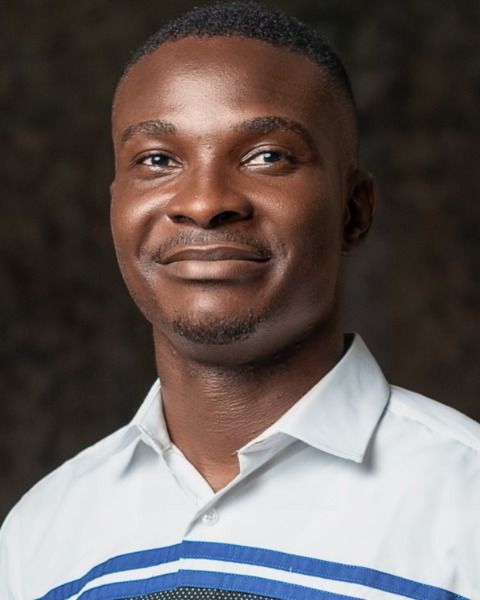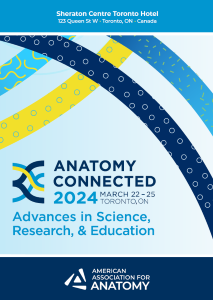Anatomy Education Posters
Poster: Anatomy Education Posters
141 - Beyond the Blade: Unveiling the Nexus of Spirituality and Cadaver Dissection Among Nigerian Medical and Allied Health Students
Sunday, March 24, 2024
5:00pm - 7:00pm US EDT
Location: Sheraton Hall
Poster Board Number: 141
There are separate poster presentation times for odd and even posters.
Odd poster #s – first hour
Even poster #s – second hour
Co-authors:
There are separate poster presentation times for odd and even posters.
Odd poster #s – first hour
Even poster #s – second hour
Co-authors:
Jude Nnaka - Anatomy - Nnamdi Azikiwe University; Muritala Suleiman, PhD - Anatomy - Kogi State University; Boma Erekosima, PhD - Human Anatomy - Rivers State University; Smart Mbagwu, PhD - Lecturer, Anatomy, Nnamdi Azikiwe University; Kingsley Ibeabuchi - Nursing - Claretian University; Ojo Gbadegesin, PhD - Theology - Evangel Theological Seminary; Godwin Uzomba, PhD - Lecturer, Anatomy, Alex Ekwueme Federal University; Aliyu Aliyu, PhD - Human Anatomy - Ahmadu Bello University

Izuchukwu A. Okafor, MSc, CEART, PME, PhD
Lecturer
Nnamdi Azikiwe University
Nnamdi Azikiwe University
Nnewi, Anambra, Nigeria
Presenting Author(s)
Abstract Body : Introduction and Objective
Cadaver dissection (CD) could potentially impact students’ spirituality, and there is a dearth of studies on the impact of CD on students’ spirituality. This study examined how CD impacts students' spiritual beliefs and how students’ pre-existing spiritual beliefs affect perceptions about CD.
Methods
This cross-sectional study assessed 761 Nigerian medical students with CD experience. The study utilized an online questionnaire developed from interviews and the Spirituality Orientation Inventory to assess the students' CD experience, spirituality, spiritual perceptions about CD, and the impact of CD on spirituality. Descriptive analysis and Chi-squared tests were used to determine proportions and relationships between the study variables, with statistical significance set at p< 0.05.
Results
Most of the respondents believe in an afterlife (75.13%), the concept of the soul (92.5%), and the human body as a vessel for the soul (91.32%). These spiritual beliefs were significantly associated (p< 0.05) with students' spiritual views about CD: disrespectful, altering the soul's journey to reincarnation, separating the physical body from its spiritual essence, and exposing someone to the spirits of the dead. About half of the respondents disagree that CD is disrespectful, and faith influences life choices for the majority (95.24%). CD lowered the students’ belief in spirits' interaction with the physical world by 5% (p< 0.001). The majority of the students agreed (p< 0.001) that CD increased their respect for the human body (76.19%), self-reflection on their own mortality (84.37%), and did not lead to profound mystical experiences (82.50%). A significant association was observed between students' gender and their mystical experiences (p = 0.008) as well as CD's ability to increase their belief in the human spirit (p = 0.019).
Conclusion
This study shows that participants' spiritual beliefs and spiritual perspectives about CD are linked, including ideas on disrespect of the human body, alteration of the soul’s journey, and separation of the body from spiritual essence. It also shows that CD is not associated with significant mystical experiences among students but challenges their belief in the deceased's spiritual interaction with the physical world.
Significance/Implication
This study reveals how CD impacts Nigerian medical students' spiritual beliefs and perceptions. The findings imply the need for culturally sensitive, ethically informed, and supportive medical education systems that address the impact of CD on students' spiritual beliefs, emotions, and ethical perspectives. The implications encompass adapting educational approaches, providing support systems, and fostering respect for the human body within medical training.
Cadaver dissection (CD) could potentially impact students’ spirituality, and there is a dearth of studies on the impact of CD on students’ spirituality. This study examined how CD impacts students' spiritual beliefs and how students’ pre-existing spiritual beliefs affect perceptions about CD.
Methods
This cross-sectional study assessed 761 Nigerian medical students with CD experience. The study utilized an online questionnaire developed from interviews and the Spirituality Orientation Inventory to assess the students' CD experience, spirituality, spiritual perceptions about CD, and the impact of CD on spirituality. Descriptive analysis and Chi-squared tests were used to determine proportions and relationships between the study variables, with statistical significance set at p< 0.05.
Results
Most of the respondents believe in an afterlife (75.13%), the concept of the soul (92.5%), and the human body as a vessel for the soul (91.32%). These spiritual beliefs were significantly associated (p< 0.05) with students' spiritual views about CD: disrespectful, altering the soul's journey to reincarnation, separating the physical body from its spiritual essence, and exposing someone to the spirits of the dead. About half of the respondents disagree that CD is disrespectful, and faith influences life choices for the majority (95.24%). CD lowered the students’ belief in spirits' interaction with the physical world by 5% (p< 0.001). The majority of the students agreed (p< 0.001) that CD increased their respect for the human body (76.19%), self-reflection on their own mortality (84.37%), and did not lead to profound mystical experiences (82.50%). A significant association was observed between students' gender and their mystical experiences (p = 0.008) as well as CD's ability to increase their belief in the human spirit (p = 0.019).
Conclusion
This study shows that participants' spiritual beliefs and spiritual perspectives about CD are linked, including ideas on disrespect of the human body, alteration of the soul’s journey, and separation of the body from spiritual essence. It also shows that CD is not associated with significant mystical experiences among students but challenges their belief in the deceased's spiritual interaction with the physical world.
Significance/Implication
This study reveals how CD impacts Nigerian medical students' spiritual beliefs and perceptions. The findings imply the need for culturally sensitive, ethically informed, and supportive medical education systems that address the impact of CD on students' spiritual beliefs, emotions, and ethical perspectives. The implications encompass adapting educational approaches, providing support systems, and fostering respect for the human body within medical training.

